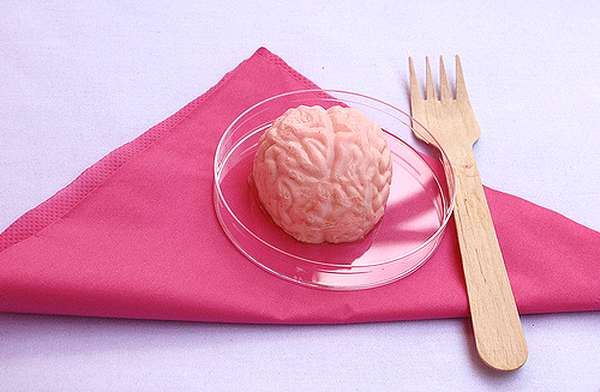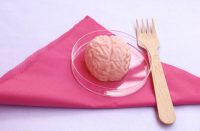Brain Bites are “now and then” updates regarding trends, statistics, and interesting info-bites in personal economics. These tasty tidbits help maintain your edge over an unpredictable future. Think of them as cerebral snacks for the hungry mind!
What goes up, never comes down
For in-state students at four-year public schools, tuition for 2015-2016 rose 2.9%.
Ref: USAA
The American Dream delayed
In a 2016 survey of 3,230 non-homeowners with student loans, 71% said they believe their education debt has delayed home ownership. Four in 10 borrowers said student loans kept them from moving out of a family member’s home. The most common debt amount of those surveyed was $20,000 to $30,000.
Ref: National Association of Realtors
It’s the money, stupid
Thirty-two university presidents received $1 million or more in compensation in 2013. Since 2008, 77 presidents have appeared on the list of millionaires at least once.
Ref: The Chronicle of Higher Education
Longer but not stronger
For the first time, passwords like “1234567890,” “qwertyuiop” (the top row of keys on a standard keyboard), and “welcome” were on the annual list of most common passwords (2015). Experts say longer passwords based on simple patterns will put you in just as much risk of having your identity stolen by hackers as short ones like “12345” and “qwerty.”
Ref: SplashData
Mind the gap
Just 62 people own as much wealth as the 3.5 billion people in the bottom half of the world’s income scale. Five years ago, it took 388 billionaires to reach that mark.
Ref: Oxfam charity
In the dark
In 2006, the U.S. Centers for Disease Control and Prevention (CDC) recommended that all people ages 13 to 64 be tested for HIV. It’s not happening—a study published in the journal Pediatrics (2016) reported that 44% of high school students and young adults age 18 to 24 with HIV don’t realize they have it.
Ref: CDC
Unwelcome houseguests
An estimated 6.4 billion connected gadgets will be in use worldwide by the end of 2016, rising to almost 21 billion by 2020. In the race to market the next BIG thing, manufacturers so far have done a poor job of building security into household devices. A hacker could slip in through a poorly protected smart appliance or WiFi router and gain access to your entire home network. Already there have been reports of baby monitors being hacked.
Ref: Gartner
Concrete figures
In just 3 years starting with 2011, China consumed 6.4 million metric tons of cement—nearly 50% more than the U.S. used in the entire 20th century, including construction of the Hoover Dam and the interstate highway system.
Ref: U.S. Geological Survey and International Cement Review
It’s been nice
Millennials are half as likely to stay with a single employer and they prioritize benefits and flexible schedules over pay.
Ref: Ernst & Young
More education = more dough
The median salary of a worker with a bachelor’s degree and no advanced degree in 2014 was $69,260. That of a worker with only a high school diploma was $34,540. The median accumulated lifetime earnings difference between a worker with a bachelor’s degree and a worker with a high school diploma is $1.5 million. Unless you’re Eminem, of course.
Ref: Bureau of Labor Statistics
Faith in free enterprise, but…
In a study on how Americans feel about capitalism (2015), 49% think free enterprise is better at lifting people out of poverty than government; 65% think most big businesses have dodged taxes, bought favors, or polluted; and 14% think the next generation will be richer, safer, and healthier than the last. Researchers predict when capitalism is viewed again to be both fair and effective, it will rebound in popularity.
Ref: Legatum Institute
Dumb, dumber, and dead
Injuries attributed to electronic device use have become so common that for the first time the National Safety Council (NSC) included distracted walking in its report on unintentional deaths and injuries. According to the publication, distracted walking incidents accounted for more than 11,100 injuries between 2000 and 2011.
Ref: NSC
You gotta have heart
People who work 11-hour days or longer are 67% more likely to develop heart disease than those who work 7 or 8 hours a day.
Ref: University College London
Til debt do us part
Two-thirds of Millennials (aged 23-35 in 2012) have at least one source of long-term debt outstanding—whether students loans, home mortgages, or car payments—and 30% have more than one. A majority report worrying about too much debt and making payments. Sizeable shares have been hit with late fees (22%), over-the-limit fees (13%), and fees for cash advances (14%).
Ref: FINRA Investor Education Foundation
Night owls have an edge
Young people who are more intelligent tend to go to bed later and get up later. In a study of sleep habits of 20,000 adolescents, on a weekday the “very dull” went to bed at an average of 23:41 and woke up at 07:20. In contrast, the “very bright” went to bed at 00:29 and got up at 07:52. On weekends, the differences were even more pronounced.
Ref: Psychology Today
Life is an endless struggle full of frustrations and challenges, but eventually you find a hair stylist you like.
~ author unknown
The information in Brain Bites is sourced from a variety of usually reliable publications. Nevertheless, we cannot guarantee the accuracy or currency of this material and a degree of common sense should be applied before quoting it. If something appears to be too good to be true, it probably is.
Image credit: “Jelly Brain Dissection” by Guerilla Science (2010), licensed/modified (red ring removed) by permission of copyright holder.

